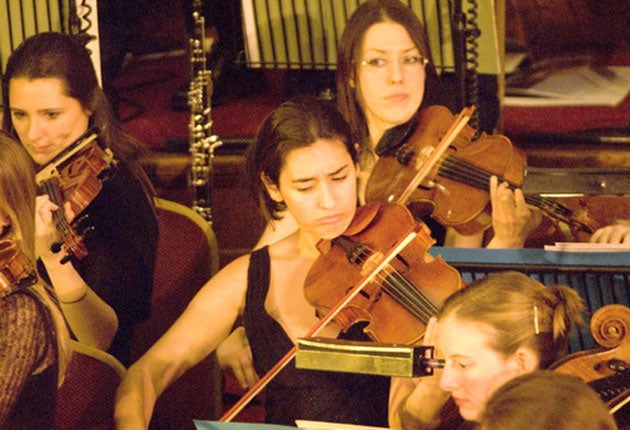Orion Symphony Orchestra, Cadogan Hall, London

Another night, another student orchestra. If you want to learn the secret of classical music's perennial good health, look no further; the conservatoires are bristling with talent. The Orion draws its players from all four London conservatoires, and the Sonitus Chamber Choir, which joined it for this event, does likewise. One purpose of this orchestra is to promote "unjustly forgotten masterpieces"; another is to give the players experience of working under real-world pressure.
The forgotten work here was an opera by one of Shostakovich's students, Veniamin Fleishman, who was killed in action in 1941. Shostakovich dutifully completed it, and Orion's artistic director Toby Purser has now devised an orchestral suite from it. The result feels like echt Shostakovich in boisterous mood, with circus oompah and melodic echoes of Prokofiev: it may not be a masterpiece, but it was worth this outing, and it did provide a showcase for the beautiful sound the leader of the orchestra, Astghik Vardanyan, can create. Her Armenian name may denote Armenian training, which would explain that sound.
The rest of the programme was stunning. Benjamin Britten's Suite on English Folk Tunes was his last orchestral work, and in its extraction of maximum effect from minimal means it displays the hand of the master. The orchestra created Britten's characteristically translucent textures, and the ancient songs and dances – with their often Stravinskyan colouring – came sweetly across. In Tippett's Negro spirituals from A Child of Our Time, the orchestral/choral/solo sound had at times a burnished perfection; Stephanie Edwards, the soprano soloist, was outstanding, with floated high notes riding with ease over brass, strings, percussion and choir. One of my personal blind spots is the syrupy English sentimentality of works such as Vaughan Williams's Serenade to Music, but here that piece was played so well I almost found myself liking it.
It was a nice idea to end with one of Shostakovich's least-known symphonies. His Ninth, written in defiance of the political commissars at the end of the Second World War, is shot through with ambiguity. The way Purser and his players negotiated the sinister muted waltz in the second movement, and the grotesquerie of the last, was masterly.
Join our commenting forum
Join thought-provoking conversations, follow other Independent readers and see their replies
Comments
Bookmark popover
Removed from bookmarks